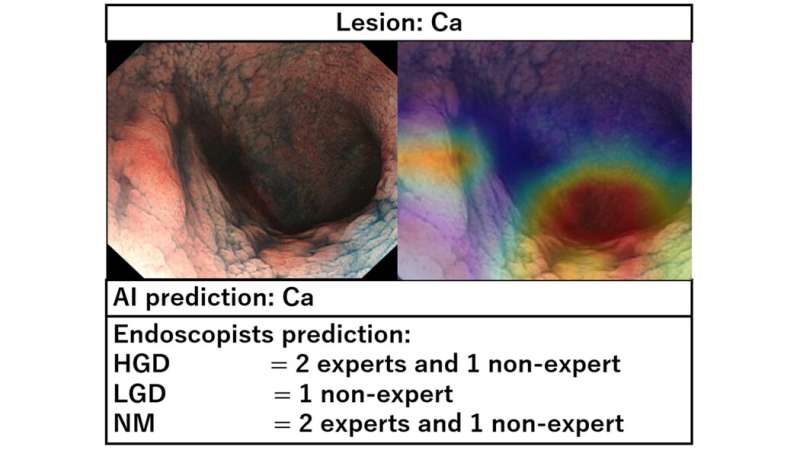New AI model for the accurate diagnosis of neoplasia associated with inflammatory bowel disease

The incidence of inflammatory bowel disease (IBD)—an intractable disease characterized by chronic inflammation of the gastrointestinal (GI) tract—has increased significantly in Japan. Chronic inflammation associated with IBD often leads to the development of cancer in the colorectal region.
For patients who have visible or low-grade dysplasia (abnormal cell growth which may not be malignant), endoscopic resection, a technique used to remove cancerous lesions, and colonoscopy are usually employed. However, for patients with a high rate of neoplasia (severe cell growth which is malignant), a total proctocolectomy, i.e., complete removal of the colon and rectum is the standard treatment, which is highly detrimental to their quality of life.
Hence, identifying the severity and grade of the neoplasia during diagnosis is essential before proceeding with treatment. Unfortunately, the presence of inflammation in the colorectal region makes it difficult for endoscopists to classify the type of IBD neoplasia (IBDN). This leaves biopsy as the only viable option, which is associated with high risks and often leads to inaccurate diagnoses, highlighting the need for a simpler diagnostic technique with high accuracy.
To this end, a team of researchers from Okayama University Graduate School of Medicine, including Assistant Professor Hideaki Kinugasa, Doctor Shumpei Yamamoto, Professor Sakiko Hiraoka, and Professor Yoshiro Kawahara conducted a pilot study to develop an artificial intelligence (AI) system that classifies IBDN lesions accurately. In addition, as part of this study, which was published in Gastroenterology and Hepatology first on May 29, 2022, they compared the diagnostic ability of endoscopists with that of the new AI system.
First, the team used a conventional neural network (CNN)—a type of neural network used for the analysis of visual imagery—known as Efficient-Net-B3, to develop the AI-system's prototype. They trained this system using 862 endoscopic images of 99 IBDN lesions from patients with IBD derived from two hospitals between 2003 and 2021, and validated it using a deep-learning framework. Next, they asked endoscopists with over 8 years of experience in gastrointestinal endoscopy to analyze the images and classify the lesions into two types based on the need for proctocolectomy, and compared their classification to that of the AI-system.
As a result of data-augmentation, the AI-system generated approximately six million images from the original data set, which were then used to analyze clinicopathological characteristics of patients and the lesions.
Based on these analyses, the team found that most patients had ulcerative colitis—a type of IBD, with more than 95% of them presenting pancolitis and left-sided colitis. Moreover, the AI-system displayed an image-based diagnostic ability with 64.5% sensitivity, 89.5% specificity, and 80.6% accuracy, and a lesion-based diagnostic ability with 74.4% sensitivity, 85% specificity, and 80.8% accuracy. What's interesting is that the correct diagnosis rate of the AI system was 79.0, while that of endoscopists was 77.8.
"Our AI-system prototype proved successful in determining the degree of malignancy of IBD-tumors and is valuable enough to contribute to clinical practice in the coming years," said Assistant Prof. Kinugasa.
The team also highlighted that combining this AI-based automatic diagnosis of neoplastic lesions with existing endoscopic diagnostic techniques might provide superior diagnostic results in real-time.
While discussing the system's additional advantages and real-life applications, Assistant Prof. Kinugasa added, "using this AI-system can ensure that endoscopists do not misdiagnose IBD neoplastic lesions, patients receive prompt treatment, and more appropriate treatment strategies are developed and applied for early as well as advanced stages of IBD."
More information: Shumpei Yamamoto et al, The diagnostic ability to classify neoplasias occurring in inflammatory bowel disease by artificial intelligence and endoscopists: A pilot study, Journal of Gastroenterology and Hepatology (2022). DOI: 10.1111/jgh.15904




















